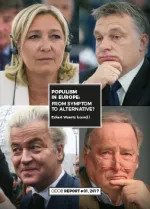Populism and its impact on multilateral institutions and economic trade

In the economic field, populism is closely linked to globalisation and the fears it raises among certain groups about potential changes to people’s jobs and well-being. In their report Fear not Values (2016), Catherine de Vries and Isabell Hoffman point out that: “The lower the level of education, the lower the income, and the older people are the more likely they are to see globalisation as a threat. Moreover, those who feel close to populist parties are mainly motivated by fear of globalisation. This effect is particularly evident when it comes to right wing populist parties, but it is also present for left wing populist parties.”
The risks posed to multilateralism by the US right are clear. During his campaign, Donald Trump threatened to leave the World Trade Organization (WTO) and as president he has proposed ignoring the organisation's rules. The threat of revoking the North American Free Trade Agreement (NAFTA) also involves possible breaches of WTO rules. Although, ultimately, the US secretary of commerce, Wilbur Ross, has decided to begin NAFTA renegotiation, the difficulty of the talks could force them back to square one. This would put the WTO in a compromising position with regard to the United States, as it would involve the organisation in the resolution of a conflict resulting from non-compliance with rules such as “most-favoured-nation” in the case that higher tariffs are imposed on Mexico than those the US has with third countries.
“Trumpism” is now the most real and recent example of populism on the right wing. The simple electoral slogan “Make America Great Again” concealed a panoply of policies that all eventually lead to unilateralism and, therefore, the calling into question of multilateral organisations. The policies will not only affect treaties already negotiated or in force. They may also distort trade. This may be the case with the legislative proposal for a border adjustment tax advocated by Paul Ryan, Speaker of the US House of Representatives, as it would tax imports and subsidise exports.
The most surprising thing about these cases is that political groups that have normally been characterised by the defence of free trade and support for multilateral institutions, such as the Republicans in the United States and the Conservatives in the United Kingdom, are now – apparently with the same values as before – defending the opposite position.
It may be assumed that right-wing protectionism and attacks on trade agreements are different in terms of their objectives to those of the anti-globalisation movements of the left (Subirats, 2017). But the reality is that in Western countries the latter anticipated what later developed in the populist right wing. The difference lies not in the aims, but in the fact that in Western countries the left has not achieved the power needed to put these policies into practice. Right-wing parties have often been voted for when it appears they will have a better chance of reaching power than the left, and, with promises of jobs and welfare, will end up promoting the same policies. Whichever direction populism comes from, the impact on multilateral institutions ends up being the same.
Thus, when it comes to trade and economic integration, the social movements and ideologies that are opposed to globalisation must been taken into account. All claim globalisation is the source of inequality and the failure to distribute the benefits of trade. This vision, shared by political positions on both right and left, is currently growing strongly. It also strengthens populist positions clamouring for greater “nationalism”, which, in turn, affect integration processes and opening up to trade through trade and investment treaties. Indeed, the right has taken up job protectionism, the expulsion of immigrants and border closure, along with expressions of xenophobia. It adds up to an effective trade protectionism proposal with strong limits on the movement of people. By contrast, the left has limited itself to lifting tariff and regulatory barriers without closing borders – a proposal with little credibility among populist voters. Hence, starting with the crisis, the trend has been marked by the consecutive victories of Brexit and Trump, as their proposals – despite affecting global free trade and European integration itself – are credible for their apparent effectiveness, based on the post-truth fed by populisms of all colours.
The anti-globalisation movements that began in Seattle in 1999 grew by opposing government initiatives on international free-trade, investment and services agreements. They mobilised against the Trade in Services Agreement (TiSA). In the European Union, they have demonstrated against the Transatlantic Trade and Investment Partnership (TTIP) and the Comprehensive Economic and Trade Agreement (CETA). They also managed to secure the rejection of the Anti-Counterfeiting Trade Agreement (ACTA) by the European Parliament, which for the first time made use of the new powers to challenge an international agreement granted by the Treaty of Lisbon.
Classic free-trade agreements responded to a specific arena of international trade, as eliminating tariffs was meant to reduce protectionism. These days, production fragmentation has produced global value chains which mean that, even in the short term, protectionism is no longer useful, not to say counterproductive. Thus, bilateral and multilateral agreements on trade, investment and services concentrate on non-tariff barriers and regulatory cooperation in order to achieve common standards. This was the rationale and the justification that prevailed prior to the rise of the populisms, which have focussed their attention on the costs of globalisation on the side of production without considering the benefits on the consumption side.
The attacks on multilateral institutions will not reverse globalisation – a phenomenon that is determined by technological change – but they will halt and limit the structuring of trade and investment by a necessary and democratic global governance. On top of this there is the risk of a collapse of the multilateral system and a backsliding in economic activity and employment. Hope lies in resisting populism, propping up multilateral organisations through democracy (Europe and Latin America) and, paradoxically, autocracy (China).